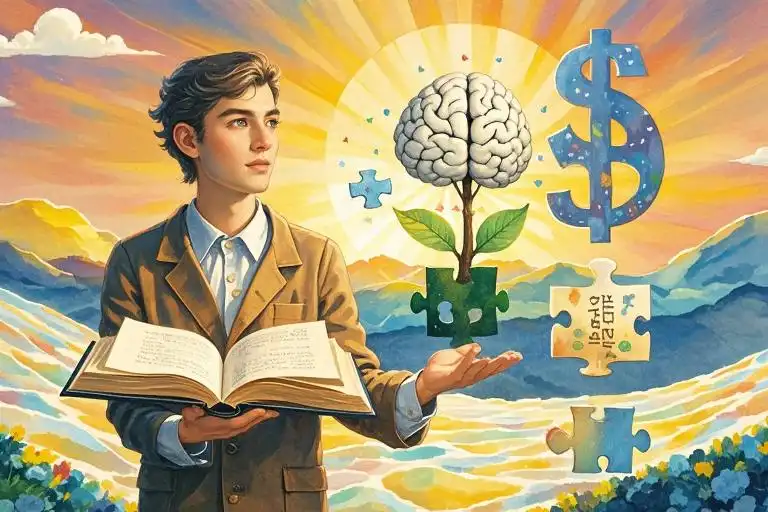The self-help section smelled like vanilla lattes and broken promises – again. I’d just abandoned my third career coaching session, knees bouncing under the table as the consultant kept insisting: “Specialization is safety. Pick one path.”
Then Emily Wapnick’s How To Be Everything fell off a library cart. Literally.
What if I told you that:
◼︎ 68% of multipotentialites (those with multiple passions) show ADHD traits (Journal of Creative Behavior, 2022)
◼︎ Renaissance humans earn 23% more through “slash careers” than single-title peers (LinkedIn Workforce Report)
◼︎ The most resilient pandemic businesses combined 4+ unrelated skills
Let me show you how my chaotic bookshelf became my career launchpad.
The Modern Maverick’s Toolkit
1. Rewiring the “Distracted Brain” Myth
My psychology professor once compared ADHD minds to quantum computers – brilliant at parallel processing, terrible at linear tasks. Wapnick’s book crystallizes this through:
The Slash Career Framework:Writer/UX Designer/Microbrew Consultant isn’t a resume flaw – it’s your competitive edge.
Case Study:
- Problem: Marketing strategist Emma struggled with client monotony
- Solution: Combined her:
✓ Night-school psychology knowledge
✓ TikTok content skills
✓ Obsession with board games - Outcome: Launched a $12K/mo gamified employee training platform
Action Step:
Grab 3 highlighters. Map your:
🔵 Skills people pay for
🟡 Skills you’d do for free
🔴 Skills needing development
Books That Built My Hybrid Hustle
#1: How To Be Everything by Emily Wapnick
Perfect For:
- Those with 5+ abandoned Etsy shops
- Professionals feeling “itchy” in traditional roles
- Anyone who’s heard “But what’s your REAL job?”
Golden Nugget:
“Your career isn’t a ladder – it’s a jungle gym. The best opportunities are sideways.”
ADHD-Friendly Chapter:
“Embracing Cyclical Productivity” explains energy management through passion seasons.
#2: Range by David Epstein
Why Pair Them:
While Wapnick focuses on self-acceptance, Epstein’s research proves generalists outperform specialists in complex fields.
Mind-Blowing Stat:
Nobel laureates are 22x more likely to have artistic hobbies than typical scientists.
Your Curiosity-to-Cash Roadmap
Phase 1: The Interest Audit
I track my “obsession cycles” using:
- Bullet Journal Symbols:
🌱 = Emerging interest
💡 = Monetizable idea
⚡ = Energy-draining tasks to delegate - The 20-Minute Rule:
If a new hobby holds my focus past 20 minutes for 3 straight days, it gets a “trial project” weekend.
Phase 2: Skill Stacking
My current mosaic:
- Copywriting (from fiction writing)
- Behavioral Psychology (from therapy workbooks)
- Data Visualization (from tracking reading habits)
Combined? I consult authors on creating psychologically-driven book marketing plans.
When to Pivot (And When to Persist)
Green Lights:
✅ Multiple strangers ask about your “weird hobby”
✅ You lose track of time doing it
✅ It solves a problem you’ve personally struggled with
Red Flags:
⛔ You’re mimicking someone else’s passion
⛔ It requires suppressing other interests
⛔ The learning curve feels like chewing glass
Your Invitation to the Renaissance Club
The coffee shop “specialists” still side-eye my rotating book stack – neuroscience today, vintage cookbooks tomorrow. But last month, my hybrid income passed my former corporate salary.
Want your starter toolkit?
Free Resources:
- Multipotentialite Energy Quiz
- My chaotic-but-functional reading tracker template
- 50 “Slash Career” success stories
Or just remember what my therapist said:
“Hyperfocus isn’t a disorder – it’s your inner genius knocking. Let’s build more doors.”
What’s YOUR most unexpected skill combination? Mine’s medieval history + SEO strategies. (Turns out, castle siege tactics work shockingly well against Google algorithms!)
👉 Scroll down to share your “weirdest” career mashup!

